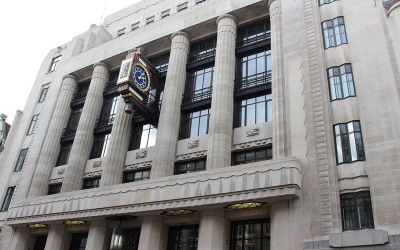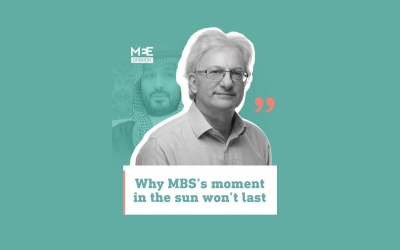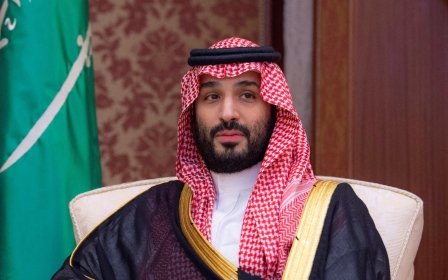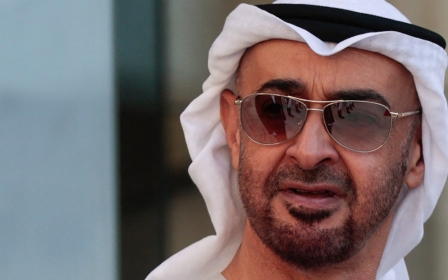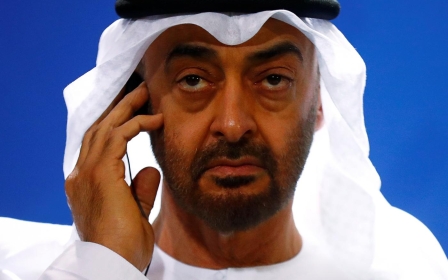Only when the UAE helps Putin does the West panic about its malign influence
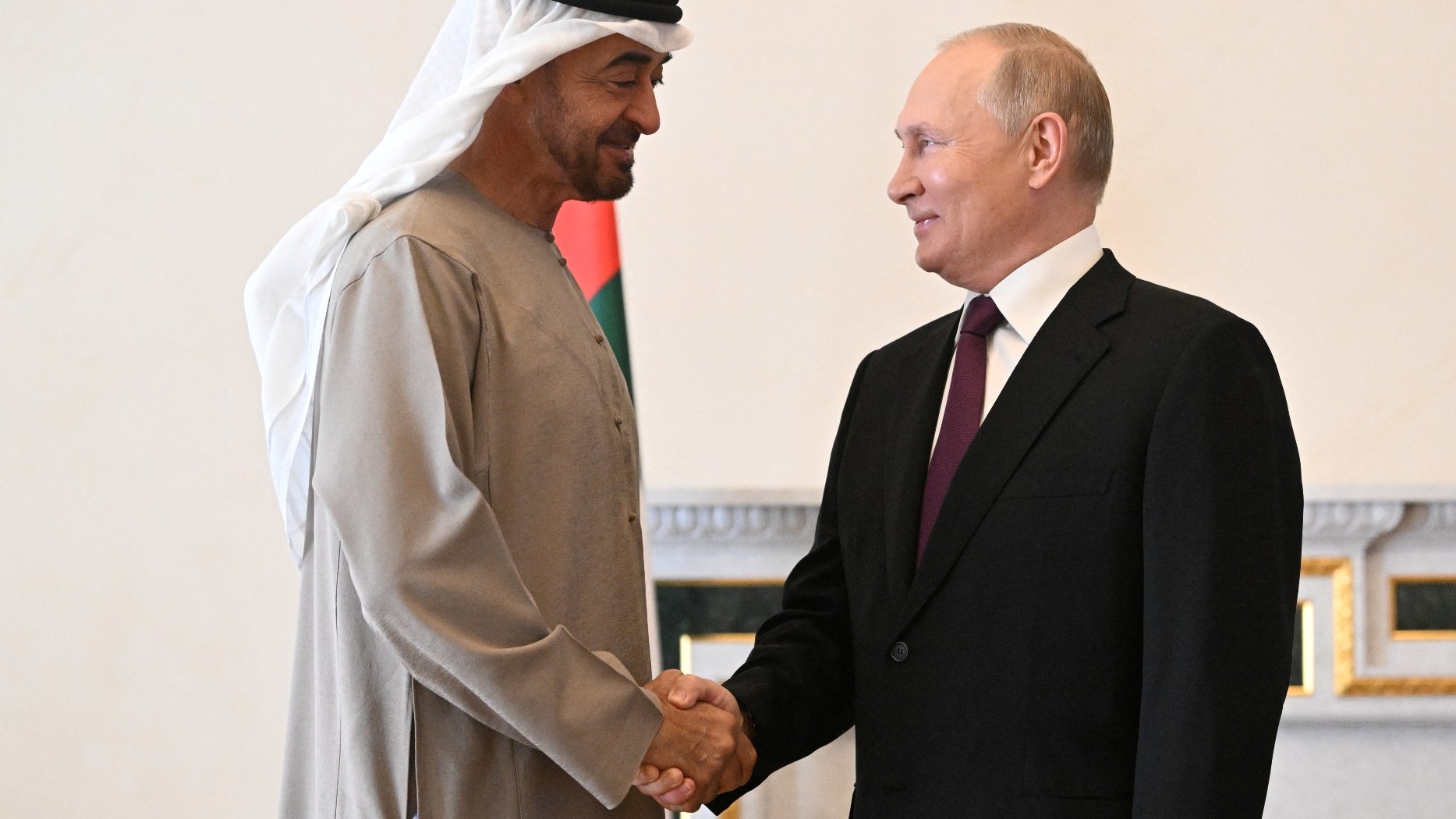
Officials from the US, the EU, and the UK said their visit to the United Arab Emirates in early September "was part of a broader effort with a range of 'partner' countries" to discuss sanctions and other measures to keep electronic parts out of Russian hands.
The Emiratis said it was an opportunity to highlight the UAE's export control framework.
No one would have guessed from these statements that exports of electronic parts from the UAE to Russia increased sevenfold to almost $283m, according to Russian customs data analysed by the Free Russia Foundation.
In 2022, the Gulf country exported 15 times more microchips, many of them made in the US, than the previous year, and 158 drones, to Russia.
Russian oligarchs evading US sanctions have swollen Dubai's property market as more than 100 aircraft have been grounded at Dubai Al Maktoum International Airport, including a $250m Boeing 787 Dreamliner belonging to former Chelsea FC owner Roman Abramovich. The US and EU have prohibited companies from insuring or maintaining their aircraft.
New MEE newsletter: Jerusalem Dispatch
Sign up to get the latest insights and analysis on Israel-Palestine, alongside Turkey Unpacked and other MEE newsletters
The arrival of wealthy Russian immigrants has flooded the local market with cash. Foreign currency flowing into the UAE has grown by 20 percent per month since May 2022, according to Capital Economics.
But the huge boom in Russian trade goes both ways. The UAE bought a record 60m barrels of Russian oil last year and $4bn of Russian gold, a staggering jump from the $61m it purchased the year before.
No wonder the US Treasury Department Assistant Secretary for Terrorist Financing and Financial Crimes Elizabeth Rosenberg called the UAE a "country of focus" whose relationship with Russia is under investigation.
The US and EU are panicking about Abu Dhabi's links with Russia. They could have just as easily looked at the eastern, western and southern parts of the spider's web that UAE President Mohammed bin Zayed (MBZ) has spun. There is plenty there to worry them too.
All of his interventions could be viewed as acting against key western interests. All play havoc with regional stability. Each adds to the growing queue of migrants on the shores of Libya and Tunisia.
The power projection game
In Yemen, the Emirati policy is to separate north from south, control Aden's strategic port, and completely take over the island of Socotra. The Emirati backing of the Southern Transitional Council gave the UAE control over many of Yemen's ports and islands with access to the strategic Bab-el-Mandeb Strait and the Horn of Africa.
The human cost of MBZ's wars is of little interest to him. His game is power projection. He is the spider at the centre of an increasingly large web
This runs directly counter to the interests of its two immediate neighbours, Saudi Arabia and Oman. Riyadh has just announced peace talks with the Houthis with the aim of ending the war. The Saudis have kept a presence to the far east of southern Yemen as a buffer zone between the Emirati-backed separatists and Oman. Both Oman and Saudi are threatened by Emirati actions.
The Saudi-Emirati rivalry is about ports and oil rather than people and the wellbeing of Yemen. According to reports leaked to Al Jazeera in 2018, Riyadh planned to construct a pipeline transporting Saudi oil to Nishtun on the Omani borders which would have bypassed the Strait of Hormuz. This would have undermined the UAE's transport network.
In Sudan, the UAE backed the attempt of the warlord Lt General Mohamed Hamdan Dagalo, known as Hemeti, to seize power on 15 April.
The conflict was started by attempts to fold Hemeti's Rapid Support Force (RSF) paramilitaries, formerly known as the Janjaweed, into the regular army. However, the earliest hours of the conflict saw RSF fighters pinning General Abdel Fattah al-Burhan, leader of the Sudanese Armed Forces (SAF), down in the basement of his residence near Khartoum Airport in an attempt to seize power.
Hemeti's coup failed, as do most of the coups the Emiratis back, but not without igniting a vicious civil war which has killed 4000 and displaced 4.5 million Sudanese.
In Libya, Khalifa Haftar, another warlord backed by the Emiratis, failed in his 2019 attempt to seize Tripoli. The country has been permanently fractured since, and each power centre in Libya's complex constellation has been weakened, to the enormous detriment of all Libyans.
The recent dam collapse, which unleashed cataclysmic floods sweeping through Derna, took place on Haftar's patch. But foreign adventures always take precedence over good governance like maintaining vital infrastructure. Agila Saleh, the head of Libya's eastern parliament, called the destruction of Derna "fate".
Haftar backed Hemeti against the wishes of the Egyptians who also once backed Haftar's attempts to wrest Western Libya from Tripoli's control. Saad Bou Shradah, a member of Libya's state council from the country's south, told Middle East Eye that Haftar's Libyan Arab Armed Forces were flying military supplies from its territory to the Central African Republic (CAR), from where they are driven by car across the border into the Sudanese interior.
In the CAR, the military situation is even more volatile. Weakened by the loss of its entire group of senior commanders who went down in Yevgeny Prigozhin's plane, the Wagner Group has sustained further significant losses in CAR, in a bid to shore up a third term for President Faustin-Archange Touadera.
Weary of Russian support, Touadera turned once again to his former French colonial rulers. Wagner is trying to enact a withdrawal.
Abdu Buda, a spokesperson for the opposition Union for Peace (UPC), told MEE: "Wagner and the CAR government - and this may be part of the Wagner withdrawal tactic - are keen to secure the situation of their ally in Sudan, which is the RSF, so they have handed huge quantities of weapons to the RSF through the Sudanese-CAR borders."
The RSF continues to deny that it is receiving any external help in its fight against the Sudanese army. But these denials are meaningless. The discovery of UAE-purchased thermobaric bombs in the hands of the RSF suggests Abu Dhabi has consolidated Hemeti's fighting power.
The centre of mayhem
What links all of these conflicts together, and Abu Dhabi to each of them, is gold.
Hemeti built up a huge personal fortune from looting Sudan's illegal gold mines and shipping it off to the gold market in Abu Dhabi, where he and his brother Abdul Rahim Dagalo bank their money.
If the Sudanese ministry of mining says that 80 percent of Sudan's gold is exported illegally, most of that trade runs through Abu Dhabi, which is the main centre for unlicensed African gold.
The US Treasury is nibbling at the fringes of this network. On 6 September, it announced sanctions against Abdul Rahim Dagalo for "the massacre of civilians, ethnic killings, and use of sexual violence".
The US State Department has further blacklisted the RSF general, Abdul Rahman Juma, for the abduction and killing of the governor of West Darfur, Khamis Abakar, and his brother.
But the US government has yet to do anything to seriously contain MBZ, the man at the centre of this mayhem, as the UAE continues its long-standing security partnership with Washington. One country after another has been laid waste by his schemes, money and arms. His proxies all have a long history of human rights abuses.
It is simply not true that the Emirati jihad is solely confined to the fight against political Islam.
MBZ's allies in Afghanistan are the Haqqanis. This was the most effective fighting force of the Taliban and Sirajuddin Haqqani, the son of the network's founder, has become the interior minister controlling key portfolios of internal security and intelligence.
This is pure realpolitik from Abu Dhabi, which has tried to keep its foot in the door by offering the disgraced pro-western President Ashraf Ghani five-star refuge after the Taliban takeover.
Emirati moves are all done to limit the influence of Qatar over the more moderate wing of the Taliban, who took part in lengthy peace talks in Doha. And it is the same pattern as with Hemeti. Through front companies and a network of Afghan expats, the Haqqanis have a solid infrastructure in the UAE.
The result is that after Qatari and Turkish negotiations broke down over who would manage Kabul airport, an Emirati consortium, GAAC, won the contract.
The human cost of his wars - to be counted in tens of thousands of Yemenis, Sudanese, Libyans and Egyptians - is of little interest to MBZ. His game is power projection. He is the spider at the centre of an increasingly large web.
At one point, Bin Zayed even promised to turn a corner. Two years ago, top UAE officials claimed to have conducted a "strategic assessment" of foreign policy, which included, among other disasters, the siege of its neighbour, Qatar. What, they asked themselves at the time, had they actually achieved in Egypt, Tunisia, Yemen and Libya?
The pivot the UAE made was in its relationship with Turkey, whose President Recep Tayyip Erdogan they also tried and failed to get rid of in their backing of the Gulenist attempted coup in 2016. Its new policy was allegedly to spread influence through economic cooperation rather than military intervention.
All this proved to be a sham.
But once again the US, which has 5,000 military personnel stationed at Al Dafra Air Base in Abu Dhabi, does nothing.
A twin delusion
Both Yemen and Sudan opened a large fissure in the relations between Riyadh and Abu Dhabi. Prime Minister and Crown Prince Mohammed bin Salman (MBS) and MBZ have avoided talking to each other for most of this year.
In July, MBS called MBZ to express condolences on the death of MBZ's half-brother, Said Bin Zayed. Both men also met briefly on the side of the G20 Summit held in India earlier this month. Yet peace has not been restored between the two men.
Immediately after the G20 Summit, MBS visited the UAE's regional rival, Oman, after which a breakthrough was announced in the war in Yemen in which the Houthis agreed to hold peace talks in Riyadh.
Field Marshal Mahdi al-Mashat, the head of the Houthis's supreme political council, praised the peace efforts, saying: "In response to the mediation of Oman, the national delegation will go, accompanied by the Omani delegation, to Riyadh to complete consultations with the Saudi side."
The meeting at the sidelines of the G20 summit was meant to counter social media chatter of a split between the two men. But the meeting has not erased the virulence of the attacks by licensed Saudi mouthpieces.
Muhammad al-Zalfa, the former member of the Saudi shura council, said that the UAE is seeking to play a role in Yemen that is bigger than its own size: "It seems that the UAE has gone too far in its projects, beyond its capabilities."
The Saudi political analyst Khalid al-Hemail attacked the UAE on X, formerly Twitter, without mentioning it by name: "There is (a state) that seeks to serve its own interests at the expense of the sovereignty of the Yemeni state. Regrettably, it has sought to drive piles through the cultivation of militias along the shores of Yemen as well as within Aden and elsewhere, imagining that these (militias) will become the tools with which it fights and pushes back against Saudi interests." He later posted that he had to remove the post at the request of Saudi and Emirati friends.
In July, the Wall Street Journal reported that the Saudi crown prince threatened to place sanctions on the UAE in a private conversation with journalists last year. It's clear this is more than just a spat between the richest members of the Gulf Cooperation Council.
As America recedes in the Gulf, a power battle is taking place over who has the upper hand in the region. Bin Zayed thinks that Mohammed bin Salman owes him for his own undoubted role in introducing the unknown 29-year-old Saudi prince to the Trump clan. And Bin Salman thinks he has outgrown the need for a tutor.
All of the upheavals fed by his much smaller neighbour threaten the futuristic investment of his kingdom MBS has poured into the west, which is the central part of his plan to modernise his country.
As America recedes in the Gulf, a power battle between the Saudis and Emiratis is taking place over who has the upper hand in the region
MBZ is under a twin delusion. He has immense wealth and has felt until now little or no constraint from Washington.
Quite the contrary, for most of the past decade, MBZ has dictated the narrative of his war against political Islam by buying up think tanks in the US capital and behaving much as the Israeli lobby does in shaping debate.
One might have thought that people in Washington and European capitals could start putting two and two together - record instability and the movement of displaced peoples across Sudan, Libya, Tunisia and the Sahel, and record numbers of migrants arriving in Lampedusa.
But at some point, this game is going to come to a sticky end. If he is as quick to react as everyone says he is, the UAE president really should read the tea leaves before it is too late.
As his bigger neighbour keeps on reminding him, his fiefdom is really very small.
The views expressed in this article belong to the author and do not necessarily reflect the editorial policy of Middle East Eye.
This article is available in French on Middle East Eye French edition.
Middle East Eye delivers independent and unrivalled coverage and analysis of the Middle East, North Africa and beyond. To learn more about republishing this content and the associated fees, please fill out this form. More about MEE can be found here.



